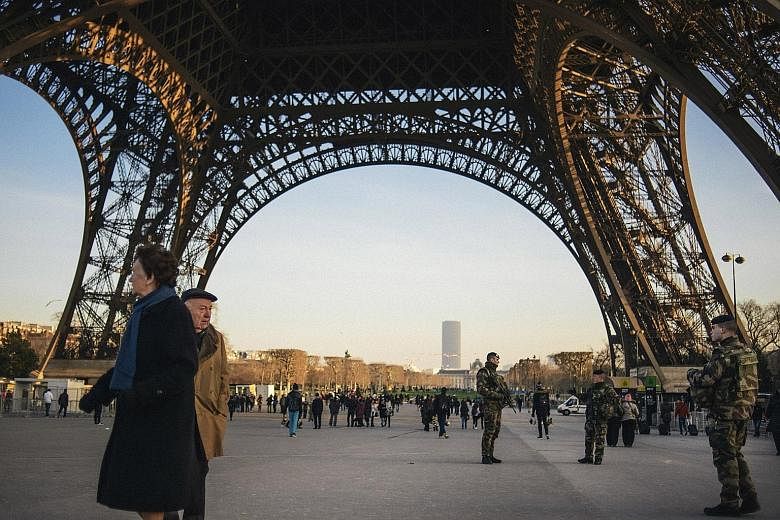PARIS • A phalanx of soldiers wearing bulletproof vests and wielding machine guns fanned out beneath the Eiffel Tower on a recent afternoon, scanning the crowd for potential terrorist threats.
Across the country, nearly 10,000 more armed troops patrolled streets around landmarks, stores and government buildings. France is spending nearly €1 million (S$1.5 million) a day on the heightened security, part of a renewed surge in European military spending as governments declare terrorism a permanent risk.
Europe's current approach to fighting terrorism, after two deadly assaults carried out by militants in Paris last year, represents a shift from the austerity mantra that has dominated the region since the debt crisis in 2010.
While countries are not abandoning their fiscal discipline, leaders are encouraging a more flexible approach to give them financial firepower to counter the growing threat.
"We need to track the terrorists, dismantle their networks, cut off their financing and stop propaganda and radicalisation," President Francois Hollande said recently, after declaring France "at war" with terrorism.
"The security pact takes precedence over the stability pact," he added, referring to the European Union's rules limiting member nations' deficits.
After the attacks by the Islamic State in Iraq and Syria (ISIS) in November in Paris that left 130 dead, the president of the European Commission, Mr Jean-Claude Juncker, authorised France to receive special treatment under budget deficit rules to strengthen security programmes.
"We are facing serious terrorist acts," he said. "France, as other countries, has to have at its disposal supplementary means."
As of last year, only four European member countries in the North Atlantic Treaty Organisation met the mandated military spending target of 2 per cent of gross domestic product. Now, European leaders are acknowledging that security spending is a priority.
The spending has the potential to provide a much-needed stimulus boost to a region that has struggled for years to kick-start growth.
Total Western European military spending, led by France, Britain and Germany, is expected to jump by an extra €50 billion through 2019, to €215 billion, said Ms Fenella McGerty, an analyst at IHS Jane's Defence Budgets in London.
Germany is hiring more police and intelligence officers and, in January, the defence minister proposed increasing military spending by €130 billion over 15 years.
France is expanding its military equipment arsenal, troops and police, as well as increasing surveillance and spending hundreds of millions of euros on new programmes to counter radicalisation among Muslim youth.
And Britain recently authorised £12 billion (S$24.4 billion) in new spending to purchase Boeing P8 maritime patrol aircraft, increase fighter squadron numbers and create new strike brigades.
Europe's security spending, though, will still pale in comparison to that of the United States. Even so, the shift could prove a windfall for security, military and arms manufacturers.
In addition to new equipment, much of the increased spending will go towards closing intelligence and security gaps that have permitted ISIS militants to travel through Europe and plan attacks.
"What has changed after the attacks is that authorities now realise the threat is permanent," said Mr Patrick Haas, director of En Toute Securite, one of the largest French security firms. "We are facing a radical shift."
NEW YORK TIMES

